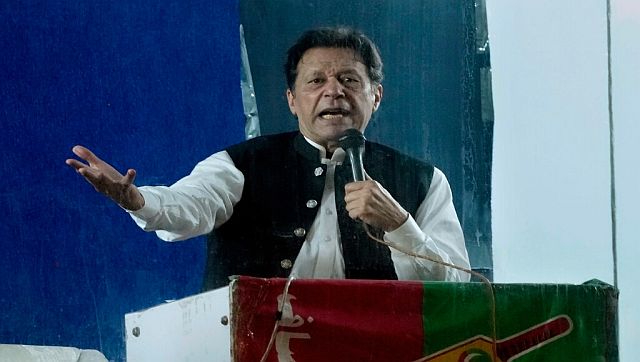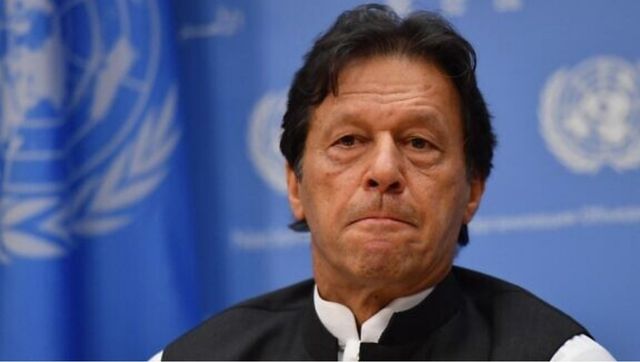Pakistan is in turmoil after the shocking arrest of Imran Khan on Tuesday outside the Islamabad High Court. Battles have broken out on the streets between Imran’s supporters and the police and emergency orders imposed across three provinces. But what comes next for Imran after his arrest? And what does this mean for his political career? Let’s take a closer look: Imran, 70, a cricket hero-turned-politician, has showed no sign of slowing down since being ousted in April 2022 as prime minister in a parliamentary no-confidence vote - even after being wounded in a November attack on his convoy as he led a protest march to Islamabad calling for snap general elections.
Some say the arrest might be just the shot in the arm Imran needs.
According to Indian Express, the events may only further Imran’s standing among his loyalists and his image as a fighter for a democratic Pakistan. The piece noted that Imran, like the prime ministers that came before him, may mount a comeback. However, his party may have to be headed up by someone more amenable to those in power in Pakistan. Another piece in the newspaper noted that Imran’s grievous error was taking on the army – which has had an outsized influence on Pakistan over the past 50 years and continues to do so – and the government. Senior Pakistani journalist Hamid Mir told India Today that while leaders belonging to the Pakistan Muslim League Nawaz and Pakistan People’s Party were arrested, but nobody challenged the army in such a way. “If Imran and his party are doing that then from a Pakistani perspective it is not good for them,” Mir added. “Imran is a product of the intelligence agencies… that is why his supporters are in shock that he was arrested not by the police but by rangers – which is controlled by the army.” According to Indian Express, while Imran’s supporters are out in force, the army is unlikely to back down. “If all goes according to the army’s script, Khan is likely to be convicted in one or more of the many cases against him, and disqualified from running for office, meeting the same fate that he was instrumental in bringing upon his predecessor Nawaz Sharif,” the piece noted. With the charismatic Imran now locked away and his legion of supporters being called out on the streets to violent protests, his political prospects are unclear. National Security Advisor Board member and security expert Tilak Devasher told ANI what happens in next few weeks will determine Pakistan’s future for coming months. “This is something that has been waiting to happen for amount of considerable time. This is a very important development in Pakistan. What happens in the next few weeks will determine what will happen in Pakistan in next couple of months.” “Irrespective of how he was arrested, there will be an outcry in Pakistan because of his popularity and because of his supporters in all the provinces.” [caption id=“attachment_12574322” align=“alignnone” width=“640”] Men on a bike ride past a burning police vehicle during a protest by Pakistan Tehreek-e-Insaf party activists and supporters of former Pakistan’s Prime Minister Imran against the arrest of their leader, in Quetta on May 9, 2023. AFP.[/caption] Imran’s arrest comes a day after the powerful military rebuked him for repeatedly accusing a senior military officer of trying to engineer his assassination and the former armed forces chief of being behind his removal from power last year. Dozens of paramilitary troops in riot-control gear surrounded Imran - Pakistan’s most popular leader according to opinion polls - and led him into a black van by his arm. His arrest came at a time when Pakistanis are reeling from the worst economic crisis in decades, with record high inflation and anaemic growth. An International Monetary Fund bailout package has been delayed for months even though foreign exchange reserves are barely enough to cover a month’s imports. Alleged property fraud Interior Minister Rana Sanaullah told reporters that Imran had been arrested by the National Accountability Bureau (NAB) after he ignored notices to turn himself in. He said Imran and his wife were accused of having received, when he was still prime minister, land worth up to 7 billion rupees ($24.7 million) from a property developer who had been charged in Britain with money laundering. Sanaullah added that British authorities had returned 190 million pounds ($240 million) to Pakistan in connection with money laundering, but that Imran had returned the money to the developer instead of keeping it in the national exchequer. “Imran is accused of commission of the offence of corruption and corrupt practices,” NAB said in a statement.
Imran has denied any wrongdoing.
GEO TV said he would be brought before an anti-corruption court on Wednesday. The graft case is one of more than 100 registered against Imran since his ouster after four years in power. In most of the cases, Imran faces being barred from holding public office if convicted, with a national election scheduled for November. Shut down Pakistan Imran’s Pakistan Tehreek-e-Insaf (PTI) party called on supporters to “shut down Pakistan” over his arrest. PTI wrote on Twitter: “It’s your time, people of Pakistan. Imran has always stood for you, now its time to stand for him.” Hundreds of Imran supporters blocked streets in cities and major highways across the country, including in Imran’s home town of Lahore and in northwestern Khyber-Pakhtunkhwa province where police went on high alert and banned public gatherings. Protesters also blocked major roads in the port city of Karachi and police fired tear gas at protesters in the capital Islamabad, according to Reuters witnesses. [caption id=“attachment_12573512” align=“alignnone” width=“640”] Supporters of Imran Khan block a road as a protest to condemn the arrest of their leader, in Peshawar. AP[/caption] Previous attempts to arrest Imran from his Lahore home resulted in heavy clashes between his supporters and law enforcement personnel. Political infighting is common in Pakistan, where no prime minister has yet fulfilled a full term and where the military has ruled for nearly half of the country’s history. Imran repeated his accusations against the military on Tuesday, adding that the same senior officer, Inter Services Intelligence (ISI) Major-General Faisal Naseer, was behind the murder of a renowned Pakistani journalist in Kenya in October.
The military has denied Imran’s allegations.
The armed forces remain Pakistan’s most powerful institution, having ruled the South Asian nation directly for close to half its 75-year history through three coups. Despite its major influence, it recently said it was no longer interfering in politics. Dozens of paramilitary troops in riot-control gear surrounded Imran - Pakistan’s most popular leader according to opinion polls - and led him into a black van by his arm. Authorities in three of Pakistan’s four provinces imposed an emergency order banning all gatherings after Imran’s supporters clashed with police, blocked major roads in a string of cities and stormed military buildings in Lahore and Rawalpindi, according to witnesses and videos shared by his party. Reuters could not independently verify the authenticity of the videos. The military’s public relations wing did not immediately respond to a request for comment. The clashes killed one of the protesters and injured 12 people, including six police officers in the southern city of Quetta, provincial home minister Ziaullah Langove said. Pakistan’s telecommunications watchdog told Reuters that mobile data services were being suspended on interior ministry orders, while Netblocks, a global internet monitor, said access to Twitter, Facebook and YouTube had been restricted. [caption id=“attachment_12573492” align=“alignnone” width=“640”] Smoke erupts a fire set by angry supporters of Imran Khan as police fire tear gas to disperse them during a protest against his arrest in Peshawar. AP[/caption] Popular support Imran enjoyed genuine popular support when he became premier in 2018, but critics say he failed to deliver on promises to revitalise the economy and improve the plight of the poor. His Pakistan Tehreek-e-Insaf (PTI) party was voted in by millions who grew up watching him play cricket, where he excelled as an all-rounder and led the nation to World Cup victory in 1992. PTI overturned decades of dominance by the Pakistan Peoples Party and Pakistan Muslim League-N - two usually feuding groups that joined forces to oust him in April 2022. Imran’s vision was for Pakistan to become a welfare state modelled on the Islamic golden age of the seventh to 14th centuries, a period of cultural, economic and scientific flourishing in the Muslim world. But he made little headway in improving Pakistan’s financial situation, with galloping inflation, crippling debt and a feeble rupee undermining economic reform. [caption id=“attachment_12572622” align=“alignnone” width=“640”]
 Government officials alleged the former prime minister and his wife received land as a bribe through a charitable trust. AP[/caption] A deteriorating security situation, particularly since the Taliban returned to power in Afghanistan in 2021, also happened on his watch. Tiptoed into politics The Oxford-educated son of a wealthy Lahore family, Imran had a reputation as a playboy until his retirement from international cricket. For years he busied himself with charity projects, raising millions to build a cancer hospital to honour his mother. He tiptoed into politics and for years held the PTI’s only parliamentary seat. But the party grew hugely during the military-led government of General Pervez Musharraf, becoming a genuine force in the 2013 elections before winning a majority five years later. Running the country proved more difficult than sitting in Opposition, however. Double-digit inflation drove up the cost of basic goods, and Pakistan had to borrow heavily just to service foreign debt. Imran also fell out with the military – key to political power in Pakistan. Married three times, his current wife Bushra Bibi comes from a conservative family and wears a veil in public. Often described as being impulsive and brash, Imran draws frequently on cricket analogies to describe his political battles. “I fight till the very last ball,” he said in one TV interview. With inputs from agencies Read all the
Latest News ,
Trending News ,
Cricket News ,
Bollywood News , India News and
Entertainment News here. Follow us on
Facebook,
Twitter and
Instagram.
Government officials alleged the former prime minister and his wife received land as a bribe through a charitable trust. AP[/caption] A deteriorating security situation, particularly since the Taliban returned to power in Afghanistan in 2021, also happened on his watch. Tiptoed into politics The Oxford-educated son of a wealthy Lahore family, Imran had a reputation as a playboy until his retirement from international cricket. For years he busied himself with charity projects, raising millions to build a cancer hospital to honour his mother. He tiptoed into politics and for years held the PTI’s only parliamentary seat. But the party grew hugely during the military-led government of General Pervez Musharraf, becoming a genuine force in the 2013 elections before winning a majority five years later. Running the country proved more difficult than sitting in Opposition, however. Double-digit inflation drove up the cost of basic goods, and Pakistan had to borrow heavily just to service foreign debt. Imran also fell out with the military – key to political power in Pakistan. Married three times, his current wife Bushra Bibi comes from a conservative family and wears a veil in public. Often described as being impulsive and brash, Imran draws frequently on cricket analogies to describe his political battles. “I fight till the very last ball,” he said in one TV interview. With inputs from agencies Read all the
Latest News ,
Trending News ,
Cricket News ,
Bollywood News , India News and
Entertainment News here. Follow us on
Facebook,
Twitter and
Instagram.


)

)
)
)
)
)
)
)
)



